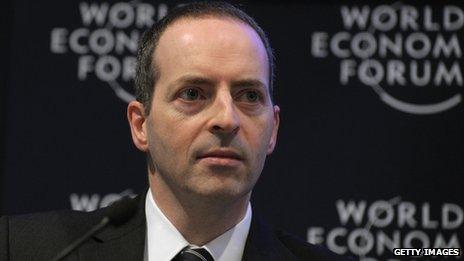BT Boss goes in to bat For Britain
- Published
- comments

He's the latest big name from the corporate world to make the journey into politics - so what does BT's Ian Livingston bring to his new job and how will he fare?
The 49-year-old Scot is to join the Department for Business as minister of state for trade and investment, though not until December.
His career at BT certainly looks impressive. He arrived from Dixons as the youngest Finance Director at a FTSE 100 company - "I was born young," he jokes to colleagues - and was made CEO in 2008 at a difficult time. The telecoms giant was grappling with a global downturn and a serious crisis in its global services division, which supplied IT networks to major corporate and public sector customers.
The following year, as the extent of the red ink in global services became clear, he cut the dividend and 15,000 jobs, and the share price fell to a low of 74p, having been above £2 when he arrived.
Today, the share price is above £3 - and the fact that it took a hit when the news of Livingston's departure was announced is evidence of how highly the market rates him.
He has managed to regain investor confidence, even while committing large sums to what might be considered risky bets - £2.5bn on superfast broadband, and £1bn on taking on BskyB with the BT Vision service.
Whenever I've met him he's seemed unusually relaxed, affable and straightforward compared with many chief executives, and those who work with him confirm that. "He's the same with everyone," says one person. "What you see is what you get."
Another former colleague talks of his phenomenal work-rate: "He's in from crack of dawn, works through lunch, and rarely seems to socialise in the evening."
Until a year ago, says this person, Livingston seemed to be a less than inspiring leader, concentrating on cutting costs while revenues continued to decline. "Then he made this massive gamble on the sports rights for BT Vision, he put all the chips on the table."
My Bottom Line: Ian Livingston
Now he is leaving, and his successor, BT Retail's Gavin Patterson, will have the task of proving that the spending spree can attract new customers and finally grow revenues again.
The question is whether his skills will translate into government. After all, many business leaders - used to underlings jumping to attention and acting on their every whim - have found Whitehall a hugely frustrating environment.
And some will question whether roaming the world trying to drum up trade is really playing to his strengths. For much of his career Livingston has been a nuts-and-bolts man, a number cruncher rather than a glad hander. His staff may point out that a quarter of BT's revenue is now earned overseas, but his main focus has been on the company's core UK business.
That business has of course had all sorts of interactions with government in that time, some of them controversial. BT's role in bringing superfast broadband to rural areas, where it has captured almost all of the £530m of taxpayers' funding, is about to come under critical scrutiny from the National Audit Office.
And then there are the frequent regulatory battles with BskyB, as BT Vision struggles to make an impact in the pay TV market. Will Sky be amused to find the former boss of its rival in a position of such influence?
One thing is pretty evident - he is not doing it for the money. While the new job does come with a peerage, there is no salary. But after receiving a total package worth at least £8.5m from BT this year - including £6m from a long-term share incentive plan - he may not be too worried.
And, by the time he starts, there will be just 18 months until the next election. Mr Livingston's move into government may prove to be a brief interlude in his business career.